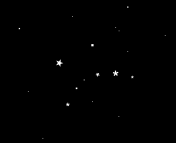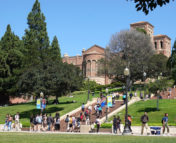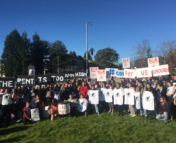This post is part of our ‘Astrobiter: X’ series where Astrobites authors share a story about their graduate experience or path into astronomy. You can read more about the series here and read more stories here.
My graduate school experience has been anything but average, to say the least.
I started graduate school in the fall of 2018 pursuing a Physics PhD at a university in Ohio. Although not offering an astronomy PhD track, I chose this university because there was a professor there that I was interested in working with. Your first year, you were required to take six (6) core physics courses and were not allowed to start research until the summer after your first year. That meant I needed to take a whole year of graduate quantum mechanics before I was allowed to even start thinking about astronomy, professionally. Also at this university, the first-year offices were in the basement — three floors below the rest of the department — in rooms affectionately called “The Dungeon.” Furthermore I was one of two women (out of 11 total students) accepted that year.
Through some special circumstances I was allowed to start research mid-way through my first year. This professor that I was interested in working with (now my research advisor) happened to have a long gamma-ray burst host galaxy project in need of a graduate student. I spent the large majority of my time reading papers about long gamma-ray bursts, their host galaxies, mass-metallicity relationships, and luminosity functions — in fact I didn’t touch any data or .fits files until the summer of my second year! This was dissimilar to my (non-astro)physics peers who were in their labs regularly creating new substrates and learning how to run an accelerator lab. I really struggled with my identity in Ohio. It was difficult being one of two women in my cohort, and it was difficult to be so separated from astronomy — physically and figuratively.
Although it sometimes felt tedious, I am grateful for reading so much of the literature before approaching the science. I feel uniquely well-versed in the question I’m trying to answer and how my data will help me to answer that question. Graduate school was proving to be a trying experience, but I found sanctuary in reading astronomy papers and talking about them with my advisor. That’s why in the fall of 2019, when my advisor announced he was transferring to Northwestern University, a university with a large and very active astro group, I absolutely said yes to the offer of transferring with him.
As we all know the months and years that followed 2019 were (and continue to be) incredibly difficult. Graduate school is already tough; it’s even more tough when you transfer to a new university in the middle of a pandemic. I didn’t feel connected to the first years, and I didn’t feel connected to my fellow third years. My research group consisted of just me, my advisor, and another student who chose to remain in Ohio. Everyone was a stranger to me, and as someone new to town, I definitely did not have a COVID-19 bubble. I was incredibly lonely, as many were in the throes of the pandemic, but really, really happy to be in an astronomy program and around so many astronomers.
I tried to address my loneliness by throwing myself into community events. I was becoming active in my research center’s social justice efforts, becoming more involved at Astrobites, and was trying to launch a Sexual Violence/Sexual Harassment prevention program. Because of the limited research connections I could get from my small group, with encouragement from my advisor, I joined another research group as an outside collaborator. It was so nice to be around so many other graduate students interested in transient astronomy at Northwestern. Things were really starting to look and feel stellar. But as we know, [some] stars explode and some experiences do too. In November 2020, my advisor told me that he was transferring yet again, this time to UC Berkeley and this time, I couldn’t come with.
Things were complicated and uncertain for a few months, but they’re clear now. My advisor continues on as my official research advisor, and I have a new local mentor at Northwestern. Both will serve on my thesis committee. My local mentor is very nice and supportive, and I am thankful to have them in my professional life in an advisory role. That said, as things ease back to in-person, I see that yet again, my experience will not be like the rest. I don’t have a local research group to go back to.
My research advisor continues to meet with me twice a week, and I am still working on my gamma-ray burst host galaxy project. At Berkeley, my advisor created a joint transient group with another professor. I attend those group meetings, and although I don’t meet regularly with this other professor, they act as a research mentor to me and will likely be a co-author on many of my publications. I like being a part of this new research group, but it is tough seeing the Berkeley team meet in person for group meetings and seminars. I wish I could do that.
My story has a lot of negatives, but a really strong positive is that I feel as though I have three very strong, well-respected, supportive faculty advising me on how to succeed in this field. That’s not something many get to say. I am forever thankful for the opportunities I have been afforded, and I feel privileged to have a career in which I get to study explosions that are 12.5 billion light years away.
Every graduate experience is unique, some especially so, and each of those experiences is valid and deserves to be shared. Each of my transfers was difficult and brought its own challenges. My first was a welcome opportunity to join an in-person astronomy community, only to be taken away by the pandemic before I could even say hello. My second was considerably less welcome, and I am still physically separate from my main research community. Through each upset, I was able to find silver linings that helped me to strengthen my love for astronomy and research. Most of that silver was support, patience, and understanding from my advisor (and new advisors too!). I hope that my story brings you hope and strength, and above all, encourages you to offer kindness to those around you. Times are tough, but so are you. If we’re all a little softer with each other, maybe we’ll all find the proverbial stars in our night skies.
Edited by: Jenny Calahan
Featured Image Credit: Edited screenshot/meme from ‘Phineas & Ferb’




